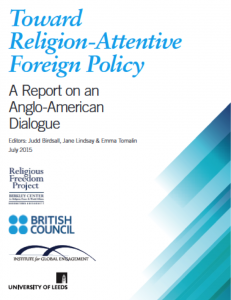 Religious Freedom & Business President Brian Grim contributed to a new trans-Atlantic report calling for foreign policy to be attentive to religious freedom’s positive contributions to social stability, political moderation, and economic development.
Religious Freedom & Business President Brian Grim contributed to a new trans-Atlantic report calling for foreign policy to be attentive to religious freedom’s positive contributions to social stability, political moderation, and economic development.
The report calls policy makers to “recognise that religious freedom is a strategic mainstream foreign policy priority, not merely a human rights issue There is a increasing awareness on both sides of the Atlantic that religious freedom is a strategic issue, integrally connected to a range of positive indicators. A growing body of quantitative research* is finding strong positive correlations between religious freedom and social stability, political moderation, and economic development.”
This was one of 15 policy recommendations in “Toward Religion-Attentive Foreign Policy: A Report on an Anglo-American Dialogue” (Editors: Judd Birdsall, Jane Lindsay & Emma Tomalin, July 2015). The report summarises key insights from the project Toward Better International Policy which was comprised of two Anglo-American dialogues organised by the Centre for Religion and Public Life at the University of Leeds, the Religious Freedom Project at Georgetown University, and the Institute for Global Engagement. These dialogues were funded by the British Council under the ‘Bridging Voices’ programme.
“In light of these findings, British and American policymakers and diplomats should not dismiss religious freedom as a nice-to-have human right, an issue on the margins of serious foreign policy.
We recommend that religious freedom promotion be woven into mainstream foreign policy formulation and implementation. And officials working directly on religious freedom issues should continue to utilise the latest research in developing strategic arguments for religious freedom, tolerance and pluralism.
These sorts of arguments are particularly important when engaging governments and societal actors that are suspicious or openly hostile to human rights discourse. On such occasions it may be advantageous to avoid human rights language altogether, as it may be counterproductive. Arguments framed around economic and political self-interest may be much more effective.”
* For socio-economic impacts see Grim, B.J., G. Clark, and R. Snyder (2014) “Is Religious Freedom Good for Business?: A Conceptual and Empirical Analysis.” Interdisciplinary Journal of Research on Religion (Volume 10: Article 4); Grim, B.J. and R. Finke (2011) The Price of Freedom Denied: Religious Persecution and Conflict in the 21st Century, Cambridge University Press and Grim, B.J. and R. Finke (2007) “Religious Persecution in Cross-National Context: Clashing Civilizations or Regulated Economies?” American Sociological Review 72:633-658.
